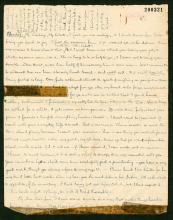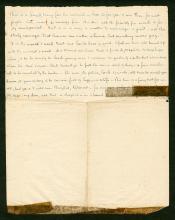BRACERS Record Detail for 19324
To access the original letter, email the Ready Division.
"Monday. My Darling, My Colette, I feel you are unhappy, and I don't know how I can bring you back to joy."
The Letter is not signed.
There are three typed versions of this letter:
Transcription, document .052419, record 99880.
Transcription, document .201121, record 116268.
Both transcriptions lack the last sentence from the first paragraph. Document .201121 has been annotated by Colette.
There is also a literary version, number 47, which contains only a few scattered sentences from the original. Literary version, document .052394, record 99859.
Letter 45
BR TO CONSTANCE MALLESON, [22? JULY 1918]
BRACERS 19324. AL. McMaster
Previous Brixton letter, BRACERS 46928; next letter, BRACERS 131599
Edited by K. Blackwell, A. Bone, N. Griffin and S. Turcon
<Brixton Prison>1
Monday.2
My Darling, My Colette,
I feel you are unhappy, and I don’t know how I can bring you back to joy. I feel the emissary from S.Y.3 worried you, as he did me. I am very anxious to know about that. Call him “Mr. Cubitt”.a And I must know more about your losing your job, and whether my name came into it.4 I do so long to be a help to you, and I seem only to bring you trouble. Dear Heart, more than half of this weary time is over5 now — less remains to be endured than we have already lived through — so it will end. It is really terrible, being parted so long. One feels ashamed almost to speak of anything as painful in these days; but I do find it very hard being kept from you when my heart aches for you every moment. It is difficult to settle to work: desire for you makes me so restless that I spend hours walking backwards and forwards in my cell, like the lions and tigers in the Zoo. Novels keep me soothed for a while. It gets worse as time goes on. Do write to me fully, about your plans and friends and thoughts and everything, however trivial — I don’t want to grow out of touch with your everyday life and mood. That is one reason I have written so much this time about plans,6 because I want your answers. There is one thing you could do for me without much trouble: when any point, say of history, turns up that you want information about, make a note of it and ask me — if I know about it, I can write out an answer.7 I have so much leisure, and it is such a relief to occupy it in ways connected with you. Your remarks on Lytton’s book8 seem to me wonderfully just and penetrating — you have a very good mind, though you always refuse to recognize it. — Please thank Miss Rinder for her very kind letter last week.9 When my brother goes10 she must take on his duties, both as to visits and agitation, if she is willing. I think I may get out before Oct. 2,11 but I don’t expect it. — This book is full of things, so look it through thoroughly.12
My dear dear Love, I don’t want to write in a way that makes things harder for you. You know that I love you with all my being, that I respect you and believe in you. This is a hard time for the world — less so for you and me than for most people. We want to emerge from this time with the faculty for work and for joy unimpaired — that is in a way a matter of courage and grit — not the steely courage that leaves one rather inhuman, but something more gay. It is the world’s need that one has to bear in mind. I feel our love all bound up with the world’s need — it is through our love that I find it possible to keep hope alive, and to be ready to lead young men and women on paths of intellectual adventure when the time comes. And I want you to feel the same sort of thing: a firm resolve not to be crushed by the burden — the war, the police, lack of work, all tries to weigh you down, and your victory is to remain full of happiness and life. This time is a fiery test for us all, but you and I will come through it, Beloved — for our own sakes and for the world’s. My dear, my dear, all that is deepest in me is bound to you indissolubly.
You will find somewhere a letter to Eliot,13 which please read, and copy the list of things I want sent to my flat, and if they are brought, get them unpacked, and be very careful of the Persian bowl.14 Please get Miss Rinder to address letter to Eliot. Please implore Miss Wrinch to send me some psychology to read.b, 15
- 1
[document] The letter was edited from the unsigned, handwritten original in the Malleson papers in the Russell Archives. It is written on both sides but only half-way down the verso of each of the two sheets of thin, laid paper, ruled on one side and folded twice, so that there was no writing on the exposed quarters of the sheets.
- 2
[date] “22nd July?” is written by Colette following the day.
- 3
emissary from S.Y. BR had written about the incident involving Scotland Yard in the letter dated [20 July 1918] (Letter 42). There he was more oblique, referring to the man as “the inquisitive emissary from Ireland Cubitt”. “Ireland” evokes “Scotland”, and a “cubitt” is a length (that of a forearm) — which was BR’s way of disguising any mention of “Scotland Yard”.
- 4
your losing your job, and whether my name came into it In Letter 43 BR had written: “Please let me know more about the row that lost you your tour. Was Miles’s pacifism the trouble, or had they caught on to me?” In her letter of 26 July (BRACERS 113145), Colette explained it as follows: “Miles had seen a great deal of Marie <Blanche> at her theatre; and her manager — that same infernal big-wig — dislikes Miles and his politics; and my politics, of course, too. So his general displeasure got vented on me, as he’d not wish to vent it on Marie, and couldn’t vent it on Miles. Of course you didn’t come into it at all.” BR must not yet have received this reply of Colette’s and so repeated the question.
- 5
more than half of this weary time is over Since BR entered prison on 1 May, this calculation (totalling c.83 days so far) implies that he anticipated serving about five months rather than the six to which he had been nominally sentenced. He expected to be released (for good conduct) on 2 October. See note 7 to Letter 24.
- 6
I have written so much this time about plans This must be a reference to Letter 42.
- 7
I can write out an answer An example is his letter of 10 August 1918 (Letter 64), in which he answered her question about a good biography of his grandfather Lord John Russell and wrote also about the Bible. Another example is “The Single Tax” (101 in Papers 14), which he seems to have sent her about 28 August (Letter 86).
- 8
Your remarks on Lytton’s book BR first praised Colette’s remarks on Lytton Strachey’s Eminent Victorians in Letter 44. See note 4 in that letter for the remarks.
- 9
her very kind letter last week It may be Rinder’s undated letter at BRACERS 79623, dated July 1918 there (sometime after 11 July when the ban on visiting prohibited areas was lifted for BR; but more narrowly after 17 July when Frank was informed of the ban’s lifting).
- 10
my brother goes Frank Russell was leaving London for his country home, Telegraph House.
- 11
may get out before Oct. 2 The date of his anticipated early release from Brixton.
- 12
This book is full of things, so look it through thoroughly. It contained more than one letter.
- 13
a letter to Eliot The letter is not extant. T.S. Eliot did, however, come to tea with Colette at her flat, perhaps to make arrangements about BR’s things (After Ten Years [London: Cape, 1931], pp. 126–7).
- 14
Persian bowl “Would you also perhaps say that your Persian bowl had been (and is) your most important objet d’art?” Colette posed this question in her letter of 2 January 1950 (BRACERS 98449). In his letter of 11 September 1918 (Letter 103), BR asked Colette to put the Persian bowl on its ebony stand on the mantelpiece in place of a bust of Voltaire.
- 15
send me some psychology to read Colette wrote on 3 August 1918 that she hoped Dorothy Wrinch “has by now sent the psychology you wanted, or that Hardy may have done so” (BRACERS 113147).


